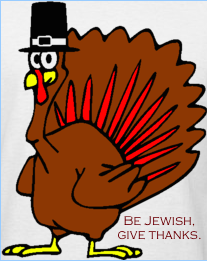Thanksgiving is perhaps one of the American people’s favorite national holidays. It is a time when individuals unite with friends and family to bask in one another’s company, increase their caloric intake, and brag about the items they intend to buy once Black Friday comes around. For students, Thanksgiving offers the opportunity to take a break from academics, head home, and visit their loved ones, whom they may not have seen since the start of the quarter. Jewish Bruins are no exception to this common tradition.
While Thanksgiving is not a Jewish holiday, we still see Jewish families all over America celebrating with the whole shebang — pumpkin pie, turkey, gravy, and lots of cranberry sauce. If you think about it, Turkey Day’s emphasis on gratitude and thankfulness coincides with Jewish ideology and practice. For example, there are Jewish prayers that thank God for practically everything in our lives — food, new clothing, bodily functions, and even for laying eyes on a beautiful sight. Every Friday evening, Jews worldwide disconnect from the bustling and materialistic environments around them to take a break and appreciate the sanctity of life.
We also find the concept of gratitude embedded in nearly every holiday on the Jewish calendar. Rosh Hashanah, the Jewish New Year, is a time when a person reflects on the past year, appreciates how far they have come, and takes advantage of the gift of another year to self-improve and amplify their relationship with God. During Passover, Jews are obligated to place themselves in the shoes of their enslaved ancestors in Egypt. On the first two days of the holiday, a person is obligated to eat foods that resemble mud, taste like tears, and leave bitterness lingering on their lips. By envisioning the shame, pain and suffering of their ancestors, Jews of today’s day and age can better understand the gravity of their predecessors’ situation, and truly feel grateful for their present-day freedom.
Although Rosh Hashanah and Passover contain elements of appreciation in them, there is perhaps one holiday that can be considered the “Jewish Thanksgiving”: That holiday is Sukkot. When people think of Sukkot, the image of tent-like structures roofed with bamboo shoots and palm leaves comes to mind. However, the holiday of Sukkot represents much more than just sitting in a makeshift home. Those huts, also known as sukkahs, are meant to replicate the sacred clouds, which protected the newly freed Jews as they wandered in the Sinai deserts for forty years.
It is interesting to note that the timing of the holiday also contributes to the theme of gratitude. Sukkot typically takes place during the start of the fall season, which follows the summer. In Israel, summer is the time of the fruit harvest, and during Sukkot, the Jews would acknowledge that their recent crop came from God. By spending the holiday in huts, farmers demonstrated an understanding that there was once a time that Jews just like them could not provide for themselves. In those times of vulnerability, it was God who protected them from harm’s way. Thus, Sukkot allows Jews worldwide to express their humility and can be described as the expression of the two words that mean the most: Thank You.
After reviewing some of the fundamental themes of Jewish holidays, one can see that it is almost natural for a Jew to feel excited about taking part in Thanksgiving. Jews are, by religious conviction, thankful people. Although one might not acknowledge Thanksgiving as an official part of the Jewish calendar, the secular holiday gives American Jews another reason to give thanks. In America, Jews can be thankful that they live in a country where they are free to practice and preserve their religion. An American Jew’s own set of customs and traditions complements the holiday of Thanksgiving in the sense that it reminds them that there was once a day when the Jews had nothing but the clothes on their backs. Today, Jews in America thrive in nearly all aspects of life. While it is nice to think that we are solely responsible for our own successes, it is imperative that we remember that there are others that need to be acknowledged for our accomplishments in this country. And, in the spirit of Judaism, there is no better way to give thanks than by spending the day surrounded by the people we love, eating food made with warmth, love and gratitude.

